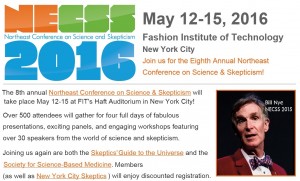Oct
31
2016
 It is unfortunate that so many journalists begin with a narrative and then back fill the facts and points necessary to tell their narrative. I have encountered this many times when being interviewed for an article or documentary – more often than not the reporter or producer is simply hunting for quotes to plug into a story they have already written. I am not giving them information so much as filling a role, which could be that of expert or of token skeptic.
It is unfortunate that so many journalists begin with a narrative and then back fill the facts and points necessary to tell their narrative. I have encountered this many times when being interviewed for an article or documentary – more often than not the reporter or producer is simply hunting for quotes to plug into a story they have already written. I am not giving them information so much as filling a role, which could be that of expert or of token skeptic.
We are all familiar with this phenomenon when reading about political topics in outlets that have a clear editorial policy. If the policy is clear, we don’t even expect objectivity. When reading about non-political topics, however, I do think there is a general expectation of objectivity, but the motivated reasoning can be just as pronounced.
A recent New York Times article, in my opinion, is a good example of what happens when a journalist writes about a complex and contentious topic and allows their narrative to overtake the facts. The article, Doubts About the Promised Bounty of Genetically Modified Crops, declares the narrative in the headline (yes, I know journalists don’t write their own headlines, but they still may accurately reflect the tone of the article, as in this case).
Continue Reading »
Dec
18
2023
 Even high quality media outlets will get it wrong from time to time. I notice this tends to happen when there is a mature and sophisticated propaganda campaign that has had enough time and reach to essentially gaslight a major portion of the public, and further where a particular expertise is required to understand why the propaganda is false. This is true, for example, for acupuncture, where even medical experts don’t have sufficient topic expertise to know why the claims being made are largely pseudoscience.
Even high quality media outlets will get it wrong from time to time. I notice this tends to happen when there is a mature and sophisticated propaganda campaign that has had enough time and reach to essentially gaslight a major portion of the public, and further where a particular expertise is required to understand why the propaganda is false. This is true, for example, for acupuncture, where even medical experts don’t have sufficient topic expertise to know why the claims being made are largely pseudoscience.
Where there is arguably the biggest gap between the scientific evidence and public opinion is genetically modified organisms (GMOs). There has been a well-funded and unfortunately successful campaign to unfairly and unscientifically demonize GMO technology, largely funded by the organic lobby but also environmental groups. Scientific pushback has ameliorated this somewhat. Further, the more time that goes by without the predicted “GMO apocalypse” the less urgent the fearmongering seems. Plus, genetic engineering works and is safe and is producing results, and people may be just getting more comfortable with it over time.
But it seems to me that there are still some people who are stuck in the anti-GMO narrative, and they are making increasingly poor and unconvincing arguments to sustain their negative attitude. An example is a recent article in The Conversation – Genetically modified crops aren’t a solution to climate change, despite what the biotech industry says. The article is by Barbara Van Dyck, who is a long time anti-GMO activist, even participating in disruptions of field trials. Let’s dive into her recent article.
Continue Reading »
Nov
10
2016
 Last week I wrote a response to a NYT article on GMOs. Massimo Pigliucci wrote a critical analysis of my response. I then responded to that piece.
Last week I wrote a response to a NYT article on GMOs. Massimo Pigliucci wrote a critical analysis of my response. I then responded to that piece.
Below is the final round of responses on this issue, one from Massimo and then a final response from me. In this round Massimo changes the focus from GMOs specifically to how the skeptical movement handles such issues.
My (further) response to Novella on GMOs
by Massimo Pigliucci
I promise, this is the last round concerning this particular discussion, at the least on my part. To recap: Danny Hakim, an investigative reporter for the New York Times, published a critical piece on certain aspects of GMO technology; my friend and fellow skeptic Steve Novella responded; I commented critically on Steve’s response; and he responded to my criticism. The current post, however, isn’t going to be yet another blow-by-blow affair, for a few reasons: i) it would be even longer than the last installment, which I fear would severely test readers’ patience; ii) there is a diminishing return to going deeper and deeper and insert more and more qualifications to any argument; and iii) it seems to me that most of what Steve and I wanted to say has been said already.
So let me try to zoom the discussion out a little, shifting attention to what I think are some background issues of which this exchange has been a particular instantiation.
Continue Reading »
Nov
08
2016

I always enjoy when someone whom I respect and who cares about using careful and valid arguments disagrees with me. It is an opportunity for me to correct any mistakes I have made, to deepen my understanding of the topic, or at least tighten up my arguments.
Last week I wrote an article responding to a recent New York Times piece on GMOs (genetically modified organisms). Massimo Pigliucci, who is a friend and skeptical colleague, disagrees with my analysis. Massimo thinks that knee-jerk defense of GMOs is a problem generally in the skeptical movement, and uses me as an example. I disagree with him, but will discuss that toward the end.
I want to take the points that I make in my previous post one by one and see how they hold up to Massimo’s criticism, and may expand upon them and include other comments as well.
GMOs should not be considered as one thing.
I wrote in my previous article:
“Any meaningful analysis of GM technology has to consider each application unto itself. Further, the GM trait is only part of the picture – you also have to consider how it is being applied.”
I have consistently taken this position in my writings, and this is also the most common position I encounter when reading other skeptics writing about GMOs. It is not really meaningful to consider GMOs as if they are one thing, and this is a mistake that Hakim makes in the original NYT article.
Continue Reading »
Oct
27
2014
After reading about genetically modified organisms for years, it seem pretty clear to me that the anti-GMO activist position is not an objective science-based position. Rather it has all the features of a political/marketing campaign. The campaign has talking points that are all spin and propaganda. Like a slick car commercial, it is selling a vibe, a worldview and a certain self-image.
Also like many political and commercial campaigns it is based on fear. Fear is a great motivator and politicians know the value of making the voters afraid of what will happen if their opponent is elected. Advertising agencies understand that you can sell a product by making it a solution to an imaginary fear. “Better safe than sorry” sells a lot of widgets.
The anti-GMO community seems closely tied to the organic food industry, which essentially sells the naturalistic fallacy on the back of irrational fears about everything artificial, whether or not there is any science behind those fears. Both, in turn, are tied to the alternative medicine community, which overlaps considerably in its fetish with all things natural, its demonizing of anything technological, and its apparent disdain for science (see Whole Foods as a good example of this overlap).
Continue Reading »
Mar
16
2017
 Glyphosate, the active ingredient in Roundup, is the most popular herbicide used in the world. It has gained particular attention because several of the more commonly used GMOs are glyphosate tolerant, and therefore are intended to be used with the herbicide. Glyphosate is also manufactured by Monsanto (although it is off patent and there are generic versions available).
Glyphosate, the active ingredient in Roundup, is the most popular herbicide used in the world. It has gained particular attention because several of the more commonly used GMOs are glyphosate tolerant, and therefore are intended to be used with the herbicide. Glyphosate is also manufactured by Monsanto (although it is off patent and there are generic versions available).
The question of the safety of glyphosate is in the news again after the New York Times did an article about a recent court case against Monsanto and the documents revealed through discovery and made public by the judge. Unfortunately, in my opinion the NYTs article is poorly done, and reveals significant bias – anti biotech bias is nothing new for the NYTs or the author of this article, Danny Hakim.
Last year I wrote about another article that Hakim wrote in the NYTs about GMOs, concluding:
In my opinion Hakim’s article in the Times was a hack piece with a biased narrative that is nothing more than a rehash of tired anti-GMO tropes that have already been widely deconstructed. He is entering this conversation late, and isn’t up to speed.
There are essentially two questions raised by Hakim’s latest article. The first concerns the behavior of Monsanto. Hakim alleges that they ghostwrote scientific articles for academics and used political pressure to shut down EPA reviews of glyphosate’s safety. I would not assume this assessment is true, and certainly don’t trust Hakim’s journalism given his history. The academics in question deny the allegations, and Monsanto claims these e-mails are taken out of context. We have certainly seen that before.
Continue Reading »
May
17
2016
 This past weekend at NECSS 2016 we invited science journalist John Horgan to give a talk on “Skepticism: Hard Versus Soft Targets.” We’re always game for some critical introspection. It keeps things interesting if nothing else.
This past weekend at NECSS 2016 we invited science journalist John Horgan to give a talk on “Skepticism: Hard Versus Soft Targets.” We’re always game for some critical introspection. It keeps things interesting if nothing else.
Unfortunately the talk, which he has now published on Scientific American’s website (which means it’s fair game), was more than a bit disappointing – not because he was critical, but because he does not seem to get skepticism with a small or a big “S.” The result was a string of cherry picked strawmen.
He begins:
“I hate preaching to the converted. If you were Buddhists, I’d bash Buddhism. But you’re skeptics, so I have to bash skepticism.”
That makes you a contrarian, not a skeptic. How about telling it like it is? Most ideas and movements are a mix of good and bad, and it often takes some effort and nuance to tease this apart. Or, you can just “bash” an entire philosophy simplistically because you fancy yourself an independent thinker. There is also nothing wrong with “preaching” to the choir – it’s not about conversion, but education.
Continue Reading »
May
05
2016

Donald Trump is the last Republican standing, which means he will be that party’s nominee. I know is this a studiously non-political blog, but this is an issue that transcends politics.
It doesn’t matter if Trump is left, right, liberal, conservative, libertarian, progressive, Democrat or Republican (he seems to be all of those things, sometimes in the same sentence). It doesn’t even matter if he is a Washington insider or outsider.
What should interest American voters the most is that Trump is an arrogant conspiracy theorist. He is an antivaccine loon. Worse, as I pointed out before, he has been publicly corrected on his incorrect views about vaccines for at least a decade, and shows no evidence of modifying his views.
He also (no surprise) denies human-caused global climate change, and even then just loosely parrots standard talking points and gets them wrong. He flirts with 911 truth. He famously is an Obama birther.
Continue Reading »
Nov
24
2015
 A new study published in PNAS explores the messaging of organizations commenting on climate change and their relationship to corporate funding. The sole author, Justin Farrell, finds that those organizations who received corporate funding were likely to network their messaging together, and to engage in a campaign of casting doubt on the scientific consensus. There was no such network among those organizations not receiving corporate funding.
A new study published in PNAS explores the messaging of organizations commenting on climate change and their relationship to corporate funding. The sole author, Justin Farrell, finds that those organizations who received corporate funding were likely to network their messaging together, and to engage in a campaign of casting doubt on the scientific consensus. There was no such network among those organizations not receiving corporate funding.
Farrell notes:
“This counter-movement produced messages aimed, at the very least, at creating ideological polarization through politicized tactics, and at the very most, at overtly refuting current scientific consensus with scientific findings of their own.”
As further evidence of corporate influence, the Washington Post notes:
The publication of the report comes two weeks after New York prosecutors announced an investigation into whether Exxon Mobil misled the public and investors about the risks of climate change. The probe was prompted in part by reports in the Los Angeles Times and the online publication Inside Climate News, alleging that Exxon researchers expressed concerned about climate change from fossil fuel emissions decades ago, even as the company publicly raised doubts about whether climate-change was scientifically valid.
This should come as no surprise to those following the climate change debate. Climate change and other issues, in fact, challenge the very notion of scientific consensus and what it means, but also demonstrate why we should listen to a robust consensus.
Continue Reading »
Oct
26
2015
 For as long as there has been anything synthetic, apparently, people have been enamored of the idea of “natural.” “Natural” has what is called a health halo, or a sense of wholesomeness, while anything artificial or chemical is presented as automatically harmful.
For as long as there has been anything synthetic, apparently, people have been enamored of the idea of “natural.” “Natural” has what is called a health halo, or a sense of wholesomeness, while anything artificial or chemical is presented as automatically harmful.
When you scratch even a little below the surface, this idea makes no scientific sense. Nature is full of horrible toxins, many of which evolved specifically to be toxic. Nature does not seem to care particularly about one rather egocentric species on Earth, and there is no reason to think that it should. The degree to which something is natural vs synthetic says absolutely nothing about its health effects, but being natural is meant to feel good.
With the advent of social media is has become easier than ever for self-styled gurus and “experts” to market themselves, and many have hit upon the marketing allure of “natural” as a hook. The Food Babe and Natural News immediately come to mind. They have taken rank pseudoscience and wrapped it in a thin veneer of “natural” marketing hype.
As is often the case, however, the famous examples of any phenomenon are usually just the tip of a large pyramid, with many more individuals struggling in relative anonymity. Further, I have often thought that if you want to, for example, figure out how a standard magic trick is performed, don’t watch the famous experts. They are too good. Watch the hacks. They are much more likely to give the trick away.
Continue Reading »
 It is unfortunate that so many journalists begin with a narrative and then back fill the facts and points necessary to tell their narrative. I have encountered this many times when being interviewed for an article or documentary – more often than not the reporter or producer is simply hunting for quotes to plug into a story they have already written. I am not giving them information so much as filling a role, which could be that of expert or of token skeptic.
It is unfortunate that so many journalists begin with a narrative and then back fill the facts and points necessary to tell their narrative. I have encountered this many times when being interviewed for an article or documentary – more often than not the reporter or producer is simply hunting for quotes to plug into a story they have already written. I am not giving them information so much as filling a role, which could be that of expert or of token skeptic.
 Even high quality media outlets will get it wrong from time to time. I notice this tends to happen when there is a mature and sophisticated propaganda campaign that has had enough time and reach to essentially gaslight a major portion of the public, and further where a particular expertise is required to understand why the propaganda is false. This is true, for example,
Even high quality media outlets will get it wrong from time to time. I notice this tends to happen when there is a mature and sophisticated propaganda campaign that has had enough time and reach to essentially gaslight a major portion of the public, and further where a particular expertise is required to understand why the propaganda is false. This is true, for example,  Last week I wrote a response to a
Last week I wrote a response to a 
 Glyphosate, the active ingredient in Roundup, is the most popular herbicide used in the world. It has gained particular attention because several of the more commonly used GMOs are glyphosate tolerant, and therefore are intended to be used with the herbicide. Glyphosate is also manufactured by Monsanto (although it is off patent and there are generic versions available).
Glyphosate, the active ingredient in Roundup, is the most popular herbicide used in the world. It has gained particular attention because several of the more commonly used GMOs are glyphosate tolerant, and therefore are intended to be used with the herbicide. Glyphosate is also manufactured by Monsanto (although it is off patent and there are generic versions available). This past weekend at NECSS 2016 we invited science journalist John Horgan to give a talk on “Skepticism: Hard Versus Soft Targets.” We’re always game for some critical introspection. It keeps things interesting if nothing else.
This past weekend at NECSS 2016 we invited science journalist John Horgan to give a talk on “Skepticism: Hard Versus Soft Targets.” We’re always game for some critical introspection. It keeps things interesting if nothing else.







